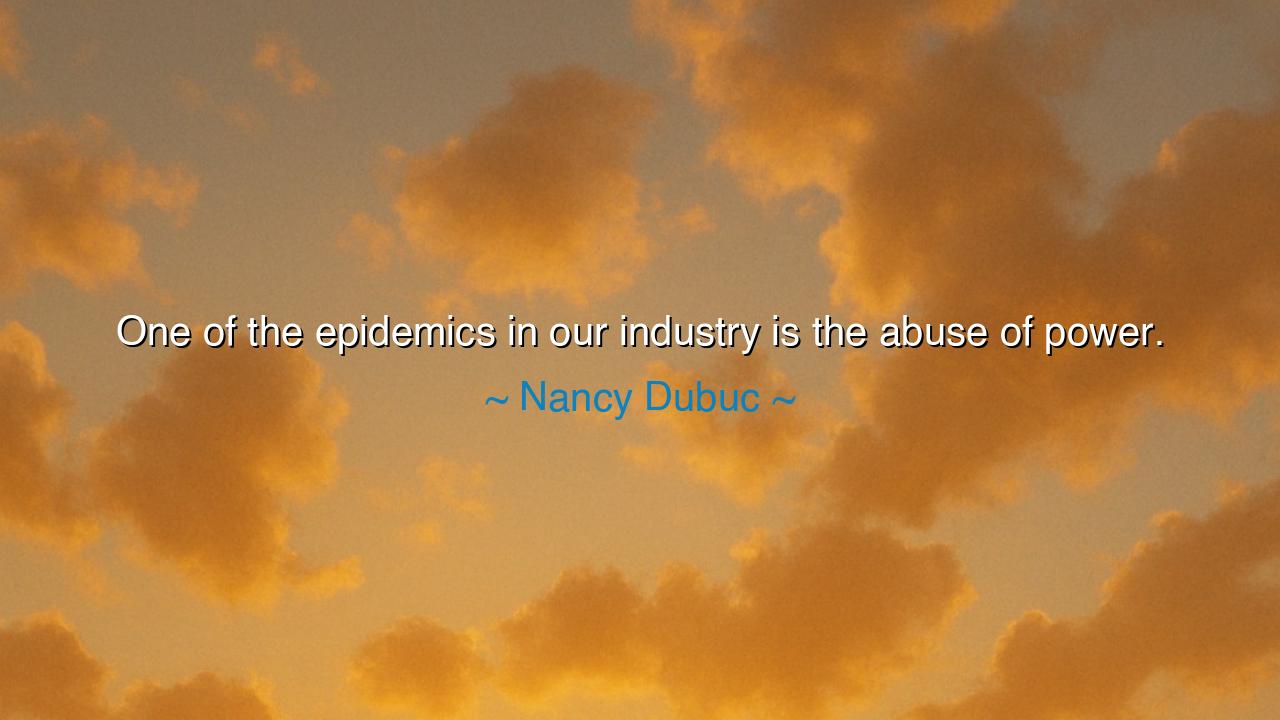
One of the epidemics in our industry is the abuse of power.






Listen, O children of the future, for I bring to you a truth that has echoed throughout the ages, a truth spoken by the wise Nancy Dubuc: "One of the epidemics in our industry is the abuse of power." These words strike at the heart of a profound and often hidden truth—that those who hold power, whether in industry, politics, or society, can be tempted to use it in ways that harm the very people they are meant to serve. Abuse of power is a sickness that spreads far and wide, often unnoticed until it has already caused great damage. In every age, this epidemic has reared its ugly head, and it is up to us to see it for what it is and fight against its spread.
Consider the ancient tyrants, whose power was built not on wisdom, but on oppression. Cyrus the Great, a conqueror who built one of the greatest empires of his time, is often remembered for his wisdom in ruling, but even he faced the temptation of abusing power. In his later years, some of his actions, though strategically sound, demonstrated how even the most powerful can fall victim to the allure of unchecked authority. When power is wielded without restraint, it can corrupt the soul and blind the ruler to the suffering of their people. This epidemic is not just of the body, but of the mind and spirit, leading to decisions that serve only the ruler’s ego, rather than the common good.
The ancient Romans also knew the dangers of power. The rise of Julius Caesar and his eventual dictatorship serves as a stark reminder. While he brought about much-needed reforms, he also set a dangerous precedent by consolidating power in his own hands, overriding the balance of the Roman Republic. His abuse of power led to the end of the Republic and the rise of the Roman Empire, where emperors ruled with absolute authority. Caesar’s reign marked a shift from governance based on the will of the people to one based on the will of a single individual, showcasing how easily power can be corrupted when it is left unchecked.
In more recent times, the abuse of power was starkly evident in the corporate world during the early years of the Industrial Revolution, where factory owners exploited workers, paying them meager wages while amassing vast fortunes. In this age, power was concentrated in the hands of a few, and the poor suffered immensely. Andrew Carnegie, though a philanthropist in his later years, was known to have abused power as a steel magnate, creating a system where the workers were expendable and their rights were ignored. His actions reflected a deeper epidemic of greed, where the concentration of wealth and influence led to widespread injustice.
So, O children, remember this: the abuse of power is a sickness that affects not only those who wield it but also those who are subjected to it. It is an epidemic that can spread through any industry, any society, and if left unchecked, it destroys the very fabric of fairness and justice. The great rulers of the past, like Cyrus and Caesar, remind us that power, when unrestrained, can lead to tyranny. Let us strive, then, to recognize and confront this epidemic in our own time, ensuring that power is wielded with wisdom, with care, and with a deep commitment to the common good. Only in this way can we build a society where power serves the people, and not the other way around.






AAdministratorAdministrator
Welcome, honored guests. Please leave a comment, we will respond soon